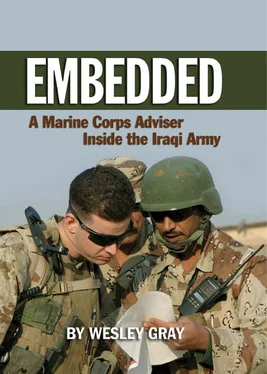Upon our arrival to Camp Ali the intensity and emotions were electric. The battalion mosque was playing martyr music over the loudspeakers and everyone in the camp came to see what was left of the bodies. I looked at Staff Sergeant Haislip and said, “Good God. I didn’t even know this many jundi existed on the camp!” Amid the mourning I was tasked with transferring the innocent detainees to the detainee questioning area. This was not a trivial task, as we had to wade through a hundred revenge-minded jundi who needed a scapegoat for their anger. We gingerly made our way through the traffic. Without my presence I’m sure the detainees would have been beaten on the spot.
Once at the questioning area I addressed Natham. “You guys will treat these detainees fairly, right?” Natham smiled. “Of course, Jamal,” he said. “We will take care of them.” I usually trust Natham, but this was one case where I was not convinced. I left the questioning area for a few minutes, planning to return to see what had transpired between the jundi and the detainees.
I returned to see the young boys with two by fours resting across their backs and the jundi yelling at them to give them information. At the beginning of my deployment I would have gone crazy and done something useless, like tell the jundi to stop what they were doing. Instead I simply spoke with Riath, one of the jundi involved in the questioning, to see how he was doing. My intent was not to actually have a conversation but to let the jundi in the area know that I was watching them and that they would need to refrain from being violent.
After the angels were transported to Al Asad, emotions died down. The detainees (who had no information) were released and received full apologies from Natham. Everyone was back to being friends. It was as if a light switch had turned off. Uncontrolled emotions can be dangerous.
I’ve told the Marines on the MiTT that regardless of their true beliefs, while they are in Iraq they will appear to be Christians who believe in God. Period. Apparently 2/3’s Fox Company Marines were never sent this memo. While in Barwana today a group of jundi approached me, obviously distraught, and asked me why the Marines don’t believe in God—truly the ultimate sin in the eyes of Iraqis.
I was caught off guard. “Uh, minu gilitek hatha?” (Uh, who told you this?) Ali, one of the jundi in the concerned group, answered, “Huwaya Marines gilitna hatha” (Many Marines have told us this). The hamster wheel started spinning in my head. I needed to think of an excuse, and fast.
Then it came to me. Deny, deny, deny. I told the jundi that they were having translation issues with the Marines and what the Marines were really saying was that they believed in God, but that they were having a difficult time figuring out how He fits into their lives. None of the Iraqis seemed to understand my fabricated explanation. Instead they asked me another question: “Jamal, where do you think children come from?” I refrained from telling them they came from a sperm and an egg meeting in the womb and then cells dividing multiple times until it formed into a functioning organism. Instead I told them, “From God, obviously.” Ali replied, “See Jamal, you understand. Why do the Marines not understand?”
I couldn’t think of what to say next. I was stuck between a rock and a hard place. I wanted to be honest and tell them that not everyone in the world believes in God, but I also didn’t want to destroy any relationships or positive feelings the jundi had toward the Marines or the West in general. I decided to go the Arab route—I lied. “Well, I think a lot of the religious beliefs get lost in the translation,” I said. “I know all Marines believe in God. Sometimes, it just doesn’t translate perfectly when they are speaking with you and it appears that Marines have doubts in God. I would not hold it against them, because they are all believers.”
The Iraqis seemed to like my explanation. As long as the Marines believed in God, they were decent people. I left the scene quickly and immediately wrote in my notebook: “For commanders: before you come to Iraq, you need to have a plan for how you will communicate your religious beliefs. The trick is to not tell these people the truth, but, rather, tell them what they want and expect to hear so it doesn’t take away from your ability to accomplish your mission. Iraqis lie all the time to ensure relationships run smoothly. Do the same. One of the ways you fight fire is with fire itself.”
T. E. Lawrence, a British military officer famous for rallying the Arab tribes against the Ottoman Empire in the early twentieth century, summed up this lesson nicely in article eleven of his “Twenty-Seven Articles” (Arab Bulletin, August 20, 1917): “The foreigner and Christian is not a popular person in Arabia. However friendly and informal the treatment of yourself may be, remember always that your foundations are very sandy ones…. Hide your own mind and person. If you succeed, you will have hundreds of miles of country and thousands of men under your orders, and for this it is worth bartering the outward show.”
There is one English phrase that every Iraqi knows by heart: “Give me.” The MiTT and I have come to realize that living on Camp Ali is a lot like being stranded on an island where two hundred beggars surround you and demand your only coconut on a daily basis. During training the culture classes always mentioned that Iraqis are into gift giving and are generous people. The instructors told us that if an Iraqi gives you a gift, you should give him something in return as a sign of respect. Likewise, if you give an Iraqi a gift as a friendly gesture, he will give you a gift in return. News-flash to future advisers: the gift-giving classes are complete bullshit. Iraqi soldiers want everything you own and have zero intention of ever giving anything to you in return. They are glorified beggars. For some reason the begging problem kept getting worse as we got closer to leaving. People only seemed to demand things; they never wanted to give anything up.
One experience exemplified begging in Iraq. I was on my way to the Iraqi COC for duty when one of the civilian cooks came galloping to me. Somehow the guy knew my name, and he addressed me as if we were life longbuddies. “Jamal, how are you doing, my brother? How’s life?” Before I could respond he butted in and asked, “Can I have your camera?” I laughed at the audacity of his request. “No, you can’t have my camera. I need it. Sorry, I have to go to work.” The begging didn’t stop: “Can I have your hat?” I told him no. “Can I have your computer?” Again I said no. He asked, “Can I have the t-shirt you are wearing?” Flabbergasted, I replied firmly, “La! Iimshee!” (No! Get out of here!)
After continuing along his laundry list of absurd requests, he blurted out, “Can I have your socks?” I stopped in my tracks. “Are you asking me for the socks I have on my feet right now?” The guy smiled, thinking I had finally caved to his requests. “Yes. Can I have them? Please give them to me.” Angry, I replied, “Listen, I am not here to give you things. And no, you can’t have the socks I’m wearing, you idiot. What the hell is your problem? You’ll have to excuse me, I must go to work.”
Later I experienced a begging incident that was the straw that broke the camel’s back. I invited Sa’ed, a young, hardworking jundi , to my hooch so I could give him some things people from America had sent me that I did not need. Of course, Abdulrachman, the leader of the admin shop, ordered Sa’ed to tell him where he was going when he set out to visit me. Abdulrachman, and some of his jundi buddies, sensing they weren’t going to get their fair share of whatever Sa’ed might be receiving, followed him to my hooch.
Читать дальше












